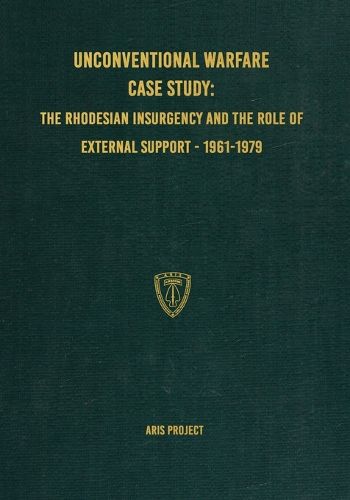Readings Newsletter
Become a Readings Member to make your shopping experience even easier.
Sign in or sign up for free!
You’re not far away from qualifying for FREE standard shipping within Australia
You’ve qualified for FREE standard shipping within Australia
The cart is loading…






This title is printed to order. This book may have been self-published. If so, we cannot guarantee the quality of the content. In the main most books will have gone through the editing process however some may not. We therefore suggest that you be aware of this before ordering this book. If in doubt check either the author or publisher’s details as we are unable to accept any returns unless they are faulty. Please contact us if you have any questions.
The political and military contest black nationalists in Rhodesia waged against the white minority governments of Winston Fields (1962-1964) and Ian Smith (1964-1979) provides an interesting case study through which to examine the dynamics of an insurgency that had the training, support, and advisory assistance of external sponsors.
The Rhodesian conflict is a unique case because the two external sponsors, the Soviet Union and China, provided support to two competing insurgent groups, the Zimbabwe African People's Union (ZAPU) and the Zimbabwe African National Union (ZANU), respectively. This dichotomy allows for the comparison and contrast of two approaches to unconventional warfare and the corresponding strategies and tactics implemented by the recipients of that support.
Additionally, the Rhodesian conflict was further complicated by the anomaly of Western and Communist powers ostensibly aligned in goal, if not in technique. While the Soviet Union and China were supporting their clients in undertaking an insurrection against the white regime, the United States, Great Britain, and other Western powers were imposing economic sanctions, to varying degrees of success, in hopes of achieving a political solution to the ultimate goal of expediting the process of handing over rule to the majority black African population.
A significant body of literature written during and after the Rhodesian conflict details the counterinsurgency efforts of the various elements of the Rhodesian Security Forces (RSF). This Unconventional Warfare Case Study focuses on the insurgents fighting against the Rhodesian Security Forces, their external supporters, how the former used that external support, and the effectiveness of insurgent activities.
$9.00 standard shipping within Australia
FREE standard shipping within Australia for orders over $100.00
Express & International shipping calculated at checkout
This title is printed to order. This book may have been self-published. If so, we cannot guarantee the quality of the content. In the main most books will have gone through the editing process however some may not. We therefore suggest that you be aware of this before ordering this book. If in doubt check either the author or publisher’s details as we are unable to accept any returns unless they are faulty. Please contact us if you have any questions.
The political and military contest black nationalists in Rhodesia waged against the white minority governments of Winston Fields (1962-1964) and Ian Smith (1964-1979) provides an interesting case study through which to examine the dynamics of an insurgency that had the training, support, and advisory assistance of external sponsors.
The Rhodesian conflict is a unique case because the two external sponsors, the Soviet Union and China, provided support to two competing insurgent groups, the Zimbabwe African People's Union (ZAPU) and the Zimbabwe African National Union (ZANU), respectively. This dichotomy allows for the comparison and contrast of two approaches to unconventional warfare and the corresponding strategies and tactics implemented by the recipients of that support.
Additionally, the Rhodesian conflict was further complicated by the anomaly of Western and Communist powers ostensibly aligned in goal, if not in technique. While the Soviet Union and China were supporting their clients in undertaking an insurrection against the white regime, the United States, Great Britain, and other Western powers were imposing economic sanctions, to varying degrees of success, in hopes of achieving a political solution to the ultimate goal of expediting the process of handing over rule to the majority black African population.
A significant body of literature written during and after the Rhodesian conflict details the counterinsurgency efforts of the various elements of the Rhodesian Security Forces (RSF). This Unconventional Warfare Case Study focuses on the insurgents fighting against the Rhodesian Security Forces, their external supporters, how the former used that external support, and the effectiveness of insurgent activities.